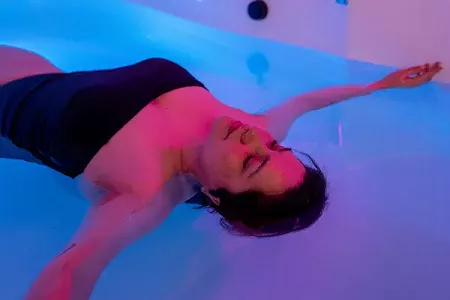Search the website
Why I float: Victor Krasowski
Victor weaves a narrative that takes us through his personal floating journey and offers a bigger-picture view on the history of floating and its healing benefits.
In the beginning
Our personal philosophy is often shaped by our upbringing. I am no exception. I was born into a family of free-spirited creatives who travelled a lot: my mum is a self-taught photographer and artist; my dad is an amateur historian who used to write poetry. My childhood was nourishing: I spent it mostly alternating between reading books and exploring the forest nearby. There were lots of costumed parties with guests singing and dancing. I have always wanted my life to be different; I did not want to follow any conventions for the sake of following them. Perhaps, it is a family thing since my younger sister turned out to be very similar to me, albeit somewhat more of a social butterfly than me. In some way, I was almost encouraged to be a rebel and it definitely shaped my life and made me the person I am today. That spirit of open-mindedness is something I have been carrying with me all my life.
It is difficult to recall when I heard about floatation for the first time. It might have something to do with my interest in the 1960s counterculture which I have always found fascinating. It is difficult to imagine the contemporary world without it. Astronauts were exploring the cosmos using the most cutting-edge technology at the time. Others were exploring the cosmos of their own minds by taking LSD sitting on the sofa in their living rooms. In the 1960s the Western world would start importing spiritual traditions of India and the Far East, such as Buddhism and Hinduism and words such as karma, chakra, and nirvana would enter the lexicon. Meditation and yoga would become widespread and practiced across the globe.
Floatation therapy was born around the same time. The idea behind floating was to detach from your physical senses in a tank where there are no external stimuli. Today floating is still somewhat underrated but I believe it has the potential to become as popular as yoga and meditation soon. To me personally, the experience is quite similar to yoga nidra, which is also known as yogic or psychic sleep. Yoga nidra is a powerful meditation technique where you feel so relaxed, like when you are floating, that you appear to be sleeping but you are actually in a state between wakefulness and sleep, where the consciousness is operating at a much deeper level.
My discovery of Floatworks
I discovered Floatworks a couple of years ago when I lived in the area and mentioned it to my boyfriend, who bought a gift voucher for my birthday which was a pleasant surprise! We both found it to be a very relaxing and enjoyable experience, yet at the time I couldn’t quite understand what floating was all about. I, as well as a couple of my close friends, had only started getting into meditation at the time and after reading some articles about floating, I realised how my meditation practice could supplement floating, and vice versa. This happened at the time when I was finishing my degree at the University of the Arts London. I was going through something I could describe as a spiritual crisis, which started towards the end of my degree. In 2015 when I was meant to be submitting my thesis proposal, I didn’t know what I wanted to write about. I emailed the director of the course saying that I needed to take some time off. I made a very spontaneous decision to move to Majorca to change the environment and clear my mind, which in hindsight was an unreasonable and impulsive move. Going to Iceland or somewhere in Siberia would have been a better option in my situation back then! Suffice to say, after spending all my savings there I had to go back to London. That very moment, I had a profound epiphany: I needed to change my life. I felt like I was creating chaos wherever I went and chaos is not sustainable. I returned to university, wrote a dissertation on hyperreality and managed to complete my degree successfully. Yet, I had absolutely no idea what I wanted to do with my life. I could see all of those different paths I could potentially take and being overwhelmed with so much choice was not easy. I turned down many job offers that someone might have considered a decent job. However, I have always been a non-conformist and I knew I wouldn’t be happy if I betrayed myself by abandoning my ideals, the most important of which for me is harmony. Only through living in tune with my values will I have peace and harmony in my life. Money and material comforts are, needless to say, important, yet they cannot be the foundation of anyone’s reality.
Working at Floatworks
I have always been a person defined by my set of values. Whilst it is great to have a strong value system, it can make life difficult sometimes. I would often find myself under-motivated and uninspired at some other jobs I have had - from assisting an optometrist to working for a media production company. Quite often I would feel misunderstood and under-appreciated. Sometimes I would simply be bored to death. Working for Floatworks is completely different. I sometimes forget that it is my job because it feels like a community of like-minded people brought together by their passion for floating. The culture of the company can be described as a combination of a trendy wellness start-up and a hippie commune. It’s a very stimulating environment where you actually feel motivated to be the best version of yourself. Everyone is into self-care: yoga, meditation, fitness, healthy eating, you name it. At the moment, the company is going through many wonderful changes such as the opening of the second centre in Angel so you can feel the excitement in the air.
Benefits of floating
People discover floating via different sources and start floatation therapy for different reasons. There are quite a few benefits floating can offer. For instance, my imagination has always been quite vivid, which has its benefits like being able to use it for my creative ideas. It also has its drawbacks. I have always been somewhat of an over-thinker and struggling with anxiety for the most of my life. At times the amount of sleep I was getting would fluctuate from a couple of hours a night to almost zero. I have found floating to be beneficial to my sleep quality primarily due to magnesium sulphate found in Epsom salts. Interestingly, magnesium is best absorbed through the skin, and once it reaches your nervous system, coupled with the complete detachment from your physical senses it causes deep relaxation, both mental and physical.
Floating is a great tool for consciousness exploration as well. It helps with my creative process, which is very important to me. I’m always working on various projects: from recording DJ sets in genres as diverse as house and ambient to one of my latest projects, where I produced and directed a music video. I’m actually working on something absolutely different right now! However, I like the sense of intrigue and I want the results to speak for themselves. Also, quite often I look for inspiration in the quiet of the Chillout room, browsing through vintage-looking journals, where floaters leave beautiful drawings and write about their experiences. Having a mind that is relaxed is crucial for developing your ideas as well as being a great float guide. Otherwise, how can you be spreading the gospel of floating convincingly when you are silently battling your own demons? In order to change the world, you need to start with yourself.
At some point, I realised that, in the words of Eckhart Tolle, “all problems are illusions of the mind”: what we think is a problem is often not a problem at all but a product of the mind. Your life won’t suddenly become perfect when you get that promotion at work, or when you find the next romantic partner, or when you buy that new pair of shoes. It is all an illusion that will leave you craving for more. It might sound like a cliché now but the change cannot come from anywhere but within.
Follow Victor Krasowski on Instagram:







